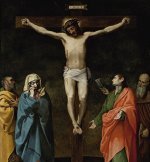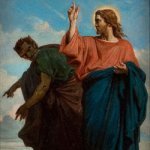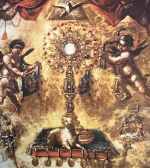JUDAS AND THE
DANGER OF DESPAIR

THE FIVE FIRST SATURDAYS IS A DEVOTION NEEDED NOW MORE THAN EVER! FIND OUT MORE HERE
THE SAINT MICHAEL PRAYER AND THE ROSARY
ARE ALSO POWERFUL PRAYERS TO HELP US THROUGH THESE VERY TURBULENT TIMES!
FATHER CHAD RIPPERGER HAS RELEASED A PRAYER FOR THE CONSECRATION OF THOSE GOVERNING TO THE BLESSED VIRGIN MARY
DETAILS (AND THE PRAYER ITSELF) HERE WITH AN UPDATED PRAYER TO OUR LADY HERE
HIGHLY RECOMMENDED! DELIVERANCE PRAYERS,
A BOOK FROM SENSUS TRADITIONIS PRESS
(A GREAT PUBLISHER HELPING US FIGHT OUR MANY SPIRITUAL BATTLES NOWADAYS)!
CHECK OUT OUR PODCAST PAGE AND OUR YOUTUBE CHANNEL FOR INSPIRING CONTENT
THIS WEBPAGE IS ALSO AVAILABLE
AS A PODCAST HERE
When reflecting on the treasonous apostle Judas Iscariot, we see the danger of despair on full display. When he realized the horrors he’d unleashed on our Lord with his betrayal of Him, rather than asking for forgiveness from Jesus, he showed contrition instead to those enemies of Jesus who could have cared less about his sudden deep sorrow, as seen in this picture above.
Overwhelmed with grief he hung himself and by doing so, he lost not only his life but Eternal Life with God for an eternity in Hell. The important takeaway from this is that one should never despair of asking for our Lord’s forgiveness in the Sacrament of Penance (Confession) no matter how great the mortal sin!
(Lent is an especially good time when meditating on Christ’s Passion to ask for God’s mercy and forgiveness for our sins in Confession.)
In addition, Judas was a man filled, one might say, with the deadly sins of pride and avarice. The apostle placed love of money over love for God. By stealing from the monies that were collected for Jesus' earthly ministry and then selling out our Lord for 30 pieces of silver he put his eternal soul in jeopardy. His suicide under these circumstances sealed his doom.
It is worth looking at some church approved private revelations, that is to say, those that we are not required to believe as Catholics that nonetheless have been approved ecclesiastically as having nothing in them contradicting church teachings on faith and morals, for some intriguing insights into the life of this wretched man whom Jesus Himself would call “the son of perdition” in the Last Supper discourse (John 17:12).
Peering into church approved private revelations both from Blessed Anne Catherine Emmerich, a 19th century nun, in the the well-known book of her visions entitled The Dolorous Passion of Our Lord Jesus Christ as well as the book The Life of Mary as Seen by the Mystics a church approved compilation from four mystics very nicely woven together by Raphael Brown to make one highly readable narrative, a picture emerges of Judas much in line with the Gospel accounts.
From both of these works we get a fuller picture of the man whom Saint John referred to directly as a thief (John 12:6) who apparently wasn’t shy about helping himself to the collection baskets of their time filled by those who wished to help provide for the apostles and disciples as they helped Jesus spread the Gospel from town to town and region to region in first century Palestine.
Besides helping himself to monies collected for Jesus and His apostles and disciples in their ministry, he also was very resentful of attempts by both our Lord and His Blessed Mother to get him to repent of these sins, as we read in Raphael Brown's compliation.
We read in scripture how Satan entered into him in the Last Supper (Luke 22:3 and John 13:27), leaving him oblivious to our Lord’s famous warning to him in His announcement to the apostles at the Last Supper that not only would He be betrayed by someone in the room with Him but that it would have been better for that man if he had never been born (Matt 26:24; Mark 14:21). This would be catastrophic for Judas.
Beforehand Judas might well have figured that Jesus would escape any severe penalties He might have incurred from His apostle's betrayal. Judas for his part would move on to greener, more lucrative pastures, perhaps even some privileged position with the powers that be!
Blessed Anne Catherine Emmerich provides some interesting background to these events in the book covering her visions. As Sister Emmerich recalled it, Satan had indeed entered into Judas that night before his betrayal of Jesus but reacted with horror when he saw the result:
Judas had not expected that his treason would have produced such fatal results. He had been anxious to obtain the promised reward, and to please the Pharisees by delivering up Jesus into their hands, but he had never calculated on things going so far, or thought that the enemies of his Master would actually bring him to judgment and crucify him; his mind was engrossed with the love of gain alone, and some astute Pharisees and Sadducees, with whom he had established an intercourse, had constantly urged him on to treason by flattering him. He was sick of the fatiguing, wandering, and persecuted life which the Apostles led.
For several months past he had continually stolen from the alms which were consigned to his care, and his avarice incited him to the commission of the greatest of crimes.
He had always hoped that Jesus would establish a temporal kingdom, and bestow upon him some brilliant and lucrative post in it, but finding himself disappointed, he turned his thoughts to amassing a fortune. He saw that sufferings and persecutions were on the increase for our Lord and his followers, and he sought to make friends with the powerful enemies of our Saviour before the time of danger, for the saw that Jesus did not become a king, whereas the actual dignity and power of the High Priest, and of all who were attached to his service, made a very strong impression upon his mind.
He began to enter by degrees into a close connection with their agents, who were constantly flattering him, and assuring him in strong terms that, in any case, an end would speedily be put to the career of our Divine Lord. He listened more and more eagerly to the criminal suggestions of his corrupt heart, and he had done nothing during the last few days but go backwards and forwards in order to induce the chief priests to come to some agreement. But they were unwilling to act at once, and treated him with contempt.
Yet he still went through with his nefarious plan, giving Jesus’ enemies logistical advice as to how best to seize and arrest Him. Once he’d delivered our Lord up to His bitter enemies to be arrested he figured he would leave the scene at Gethsemane unscathed, again according to Sister Emmerich,
[that] he might run away like the other disciples and be no more heard of. He likewise thought that, perhaps, a tumult would ensue, that the Apostles might defend themselves, and Jesus pass through the midst of his enemies, as he had so often done before. He dwelt upon these thoughts especially, when his pride was hurt by the disdainful manner of the Jews in his regard; but he did not repent, for he had wholly given himself up to Satan.
However, those discussing the horrors he’d help to unleash on Jesus opened his eyes and ears to the terrible truth of what he’d set in motion as he heard people talking about him while Jesus was being sent to Pontius Pilate:
The traitor Judas walked about listening to the conversation of the crowd who followed, and his ears were struck by words such as these: ‘They are taking him before Pilate; the High Priests have condemned the Galilean to death; he will be crucified; they will accomplish his death; he has been already dreadfully illtreated; The miscreant who sold him was one of his disciples; such an infamous character as this disciple is infinitely more deserving of death.’
Sister Emmerich’s account continues thus:
Then, but too late, anguish, despair, and remorse took possession of the mind of Judas. Satan instantly prompted him to fly. He fled as fast as possible, but where did he fly? Not towards the crowd, that he might cast himself at the feet of Jesus, his merciful Saviour, implore his pardon, and beg to die with him,—not to confess his fault with true repentance before God, but to endeavour to unburden himself before the world of his crime, and of the price of his treachery.
He ran like one beside himself into the Temple, where several members of the Council had gathered together after the judgment of Jesus. They looked at one another with astonishment; and then turned their haughty countenances, on which a smile of irony was visible, upon Judas.
He with a frantic gesture tore the thirty pieces of silver from his side, and holding them forth with his right hand, exclaimed in accents of the most deep despair, ‘Take back your silver—that silver with which you bribed me to betray this just man; take back your silver; release Jesus; our compact is at an end; I have sinned grievously, for I have betrayed innocent blood.’
The priests answered him in the most contemptuous manner, and, as if fearful of contaminating themselves by the contact of the reward of the traitor, would not touch the silver he tended, but replied, ‘What have we to do with thy sin? If thou thinkest to have sold innocent blood, it is thine own affair; we know what we have paid for, and we have judged him worthy of death. Thou hast thy money, say no more.’ They addressed these words to him in the abrupt tone in which men usually speak when anxious to get rid of a troublesome person, and instantly arose and walked away.
These words filled Judas with such rage and despair that he became almost frantic: his hair stood on end on his head; he rent in two the bag which contained the thirty pieces of silver, cast them down in the Temple, and fled to the outskirts of the town.
I again beheld him rushing to and fro like a madman in the valley of Hinnom: Satan was by his side in a hideous form, whispering in his ear, to endeavour to drive him to despair, all the curses which the prophets had hurled upon this valley, where the Jews formerly sacrificed their children to idols.
Overcome by these terrible thoughts Judas rushed on, and reached the foot of the mountain. It was a dreary, desolate spot filled with rubbish and putrid remains; discordant sounds from the city reverberated in his ears, and Satan continually repeated, ‘They are now about to put him to death; thou has sold him. Knowest thou not the words of the law, “He who sells a soul among his brethren, and receives the price of it, let him die the death”? Put an end to thy misery, wretched one; put an end to thy misery.’
Overcome by despair Judas tore off his girdle, and hung himself on a tree which grew in a crevice of the rock, and after death his body burst asunder, and his bowels were scattered around.
There’s a valuable lesson to be learned when meditating on the life and tragic end of this treasonous apostle. Judas’ greed and a most deadly form of pride gave Satan a golden opportunity to enter into his soul to create havoc.
When Judas saw that his treachery led to Jesus’ arrest and would lead to his execution as well, suddenly too late his eyes were opened as to what he had put in motion in his betrayal of our Lord. He focused his sudden contrition on those enemies of Jesus who had no use for him as he threw his ill-gotten gain at them, those famous 30 pieces of silver!
After that he committed suicide by hanging himself! It is a quite plausible notion that if Judas sealed his damnable fate for eternity it was from that tree on which he hung himself. Had he shown that intense a level of contrition to our wounded and soon-to-be crucified Lord in some fashion asking for His pardon and mercy, there might very well be a St. Judas feast day on the Church's liturgical calendar!
Indeed, while the following two insights in this regard come from private revelations, we are not required to believe these as Catholics. They nonetheless provide sobering Divine counsel against the great sin of despair.
The first one comes from Christ’s words to Sister Josefa Menendez, a Spanish nun to whom he give many private revelations in the 1920’s:
After the betrayal at the Garden of Olives, Judas wandered away a fugitive, a prey to the most reproaches of his conscience which taxed him with the most execrable of sacrileges. And when he heard that I was condemned to death, he gave himself up to despair and hanged himself. Who can measure the deep and intense grief of my heart when I saw this soul so long taught by love, the recipient of My doctrine, one who had so often heard from my lips words of forgiveness for the most heinous crimes, finally throw himself into hell fire?
Ah! Judas, why not throw yourself at My feet that I may forgive you too? If you are afraid to come near me because of the Raging mob that surrounds me at least look at Me… My eyes will meet yours for even now they are lovingly intent upon you. Oh all you who are steeped in sin,... when the motives or accomplices of your sin have forsaken you, and you realize the state of your soul, oh then, do not yield to despair! for as long as a breath of life remains a man may have recourse to Mercy and ask for pardon.
God the Father expressed similar thoughts in his private revelations to St. Catherine of Siena in the Spiritual Classic The Dialogue from the 14th Century when he told her that “the despair of Judas displeased Me more, and was more grave to My Son than was his betrayal of Him.”
Keep in mind that Satan’s specialty is to goad us into committing grave sins by stressing God’s mercy and then, once we’ve committed them, to make us feel we can never receive that mercy, in order to keep us from reaching out to our Lord in contrition in Confession.
Remember as well, that just as God can draw good out of evil, as He clearly did from His Passion, so can so many of us draw evil out of some perceived but clearly disordered good. Would that Judas were the only one of us to betray Jesus in hot pursuit of fortune and fame!
Our Lord’s words in the Sermon on the Mount ring true here: While his master pointed out most famously that you cannot serve God and mammon (Matt 6:24) for Judas, his love of money (and perhaps worldly status) at a critical moment overwhelmed whatever love he might have had for God.
Now, with the apostasy in the church and chaos in the world, is an especially crucial time for each of us to keep God front and center in our lives!
FROM OUR BOOK AND GIFT STORE
OR CAFE PRESS STORE!
Return from Judas and Despair
to Prayer Blog Page














